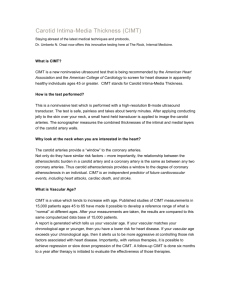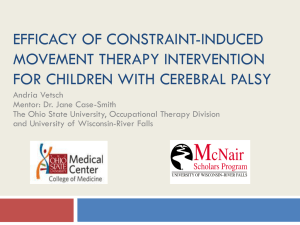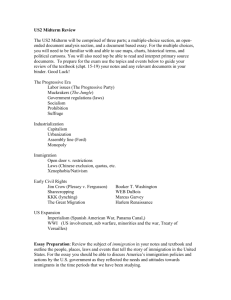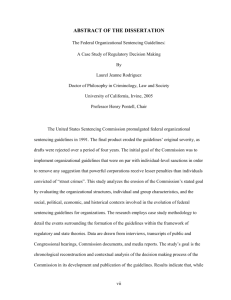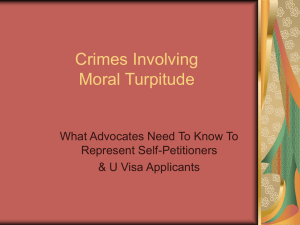Negotiating 180 day Sentences for Gross Misdemeanors
advertisement
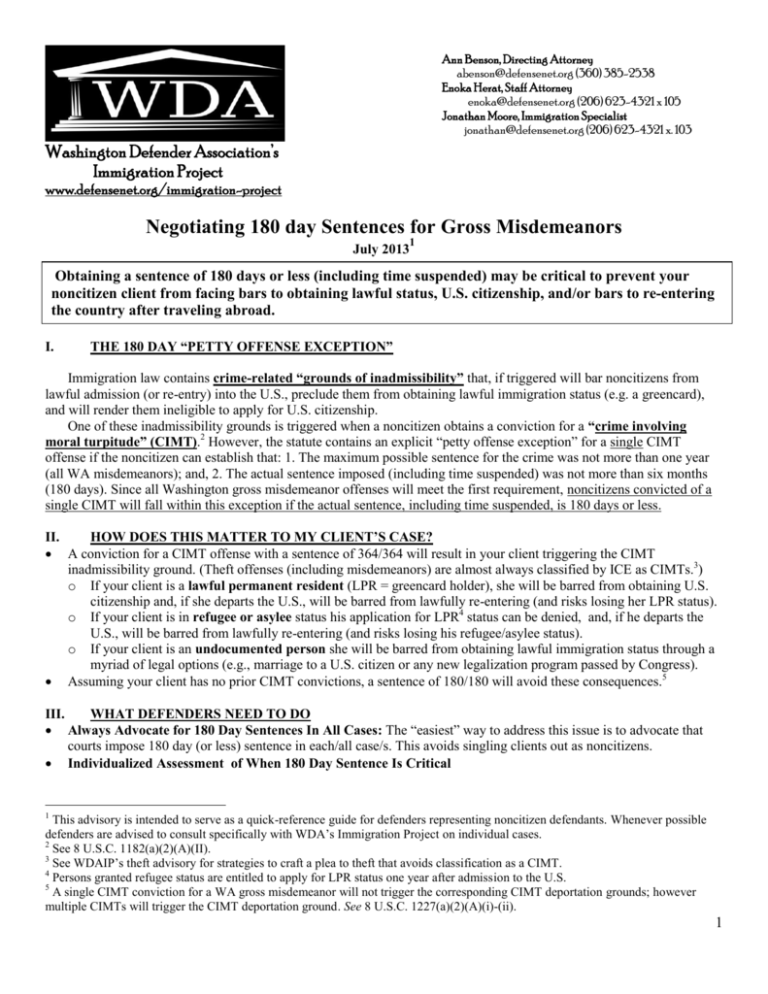
Ann Benson, Directing Attorney abenson@defensenet.org (360) 385-2538 Enoka Herat, Staff Attorney enoka@defensenet.org (206) 623-4321 x 105 Jonathan Moore, Immigration Specialist jonathan@defensenet.org (206) 623-4321 x. 103 Washington Defender Association’s Immigration Project www.defensenet.org/immigration-project Negotiating 180 day Sentences for Gross Misdemeanors 1 July 2013 Obtaining a sentence of 180 days or less (including time suspended) may be critical to prevent your noncitizen client from facing bars to obtaining lawful status, U.S. citizenship, and/or bars to re-entering the country after traveling abroad. I. THE 180 DAY “PETTY OFFENSE EXCEPTION” Immigration law contains crime-related “grounds of inadmissibility” that, if triggered will bar noncitizens from lawful admission (or re-entry) into the U.S., preclude them from obtaining lawful immigration status (e.g. a greencard), and will render them ineligible to apply for U.S. citizenship. One of these inadmissibility grounds is triggered when a noncitizen obtains a conviction for a “crime involving moral turpitude” (CIMT).2 However, the statute contains an explicit “petty offense exception” for a single CIMT offense if the noncitizen can establish that: 1. The maximum possible sentence for the crime was not more than one year (all WA misdemeanors); and, 2. The actual sentence imposed (including time suspended) was not more than six months (180 days). Since all Washington gross misdemeanor offenses will meet the first requirement, noncitizens convicted of a single CIMT will fall within this exception if the actual sentence, including time suspended, is 180 days or less. II. HOW DOES THIS MATTER TO MY CLIENT’S CASE? A conviction for a CIMT offense with a sentence of 364/364 will result in your client triggering the CIMT inadmissibility ground. (Theft offenses (including misdemeanors) are almost always classified by ICE as CIMTs.3) o If your client is a lawful permanent resident (LPR = greencard holder), she will be barred from obtaining U.S. citizenship and, if she departs the U.S., will be barred from lawfully re-entering (and risks losing her LPR status). o If your client is in refugee or asylee status his application for LPR4 status can be denied, and, if he departs the U.S., will be barred from lawfully re-entering (and risks losing his refugee/asylee status). o If your client is an undocumented person she will be barred from obtaining lawful immigration status through a myriad of legal options (e.g., marriage to a U.S. citizen or any new legalization program passed by Congress). Assuming your client has no prior CIMT convictions, a sentence of 180/180 will avoid these consequences.5 III. WHAT DEFENDERS NEED TO DO Always Advocate for 180 Day Sentences In All Cases: The “easiest” way to address this issue is to advocate that courts impose 180 day (or less) sentence in each/all case/s. This avoids singling clients out as noncitizens. Individualized Assessment of When 180 Day Sentence Is Critical 1 This advisory is intended to serve as a quick-reference guide for defenders representing noncitizen defendants. Whenever possible defenders are advised to consult specifically with WDA’s Immigration Project on individual cases. 2 See 8 U.S.C. 1182(a)(2)(A)(II). 3 See WDAIP’s theft advisory for strategies to craft a plea to theft that avoids classification as a CIMT. 4 Persons granted refugee status are entitled to apply for LPR status one year after admission to the U.S. 5 A single CIMT conviction for a WA gross misdemeanor will not trigger the corresponding CIMT deportation grounds; however multiple CIMTs will trigger the CIMT deportation ground. See 8 U.S.C. 1227(a)(2)(A)(i)-(ii). 1 o IV. Identify whether offense at issue is a Crime of Moral Turpitude (CIMT). Only convictions that are classified as CIMT offenses (e.g., theft) will trigger the CIMT inadmissibility ground. If facing a first conviction for a CIMT offense, a 180 day sentence is critical for all noncitizen clients. o Multiple CIMT convictions will trigger the CIMT inadmissibility ground regardless of any sentence imposed for the offenses. Identifying whether client has prior CIMT convictions will determine how critical it is to advocate for 180 days in the present case. File an appeal of The Sentence Where Court Refuses To Impose 180 days. See WDAIP resources for assistance. KEY ARGUMENTS FOR OBTAINING A 180 DAY SENTENCE WA Law Requires Individualized and Proportional Sentencing. RCW 9A.020.021(2) permits a prosecutor to request, and a court to impose, a period of time between 0 and 364 days for a gross misdemeanor offense. Washington caselaw mandates that judges exercise individualized discretion in fashioning the actual sentence in any given case, including the maximum time imposed.6 To make such a determination, the law also makes clear that a court should have access to a wide range of information about the defendant and must consider all relevant factors during sentencing.7 The long-established practice of routinely imposing 364 day sentences in most gross misdemeanor cases (regardless of time suspended) compromises this requirement of individualized determination by jettisoning any meaningful effort to determine a punishment that is proportional to the crime. This common practice may allow for more expeditious and seemingly “uniform” sentencing practices, but it does not comport with the law. Additionally, imposition of this maximum period is a significant burden on a defendant, even if such period of time is never served. It should be the exception, not the rule. While the majority of misdemeanor defendants never come close to serving the maximum period of time imposed by the court, having a 364 day sentence hanging over them is a significant burden which is not warranted in all, or even most, cases. Immigration Consequences Are Not Collateral And Should Be Considered In Sentencing. In Padilla v. Kentucky, 130 S.Ct. 1473 (2010), the U.S. Supreme Court held that immigration consequences are a severe penalty, not a collateral consequence, that must be considered in the resolution of criminal proceedings. The Court highlighted that providing “informed consideration” of immigration consequences in the resolution of the criminal proceedings is in the State’s interest and specifically sanctioned crafting a sentence to avoid deportation as an acceptable means of ensuring that justice is served.8 In State v. Sandoval, 171 Wash.2d 163 (2011), the Washington Supreme Court also recognized the severity of immigration consequences and held that effective assistance of counsel requires an affirmative duty to address immigration consequences. In light of the Padilla and Sandoval, the potential immigration consequences to a noncitizen defendant are critically relevant factors for consideration by the court. Sentencing That Factors Immigration Consequences Does Not Violate Equal Protection or the Supremacy Clause. In State v. Osman, 157 Wn.2d 474 (2006), the Washington Supreme Court explicitly held that taking a noncitizen’s immigration status into account at sentencing was both necessary and appropriate and does not violate equal protection. Failure to consider immigration consequences in fashioning a defendant’s sentence is not a violation of equal protection but rather, an abuse of discretion. Equal protection in misdemeanor sentencing requires that the trial judge endeavor to fashion a just punishment in light of the totality of circumstances of any particular case. The U.S. Constitution contains a Supremacy Clause that forbids a state from passing a law that conflicts with federal law. U.S. Const. Art. VI, Cl.2. The U.S. Supreme Court has made clear that where state law does not actually conflict with federal immigration law and where it is an area of law not traditionally occupied by federal law, state law will be respected.9 Sentencing a defendant for a violation of a state criminal statute is unquestionably within the purview of state law. In State v. Quintero-Morelos, 133 Wn.App. 591, 600 (2006), the Court of Appeals affirmed that a Washington court does not violate the Supremacy Clause of either constitution when it considers immigration consequences at sentencing. 6 See e.g., State v. Harris, 10 Wn. App. 509, 513, 518 P.2d 237 (1974) (sentencing judge has an “obligation to make the punishment fit the man rather than the crime”). 7 See e.g., State v. Russell, 31 Wn. App. 646, 648, 644 P.2d 704 (1982) (sentencing judge must possess the fullest information possible concerning the defendant’s past life and personal characteristics.). 8 Padilla, 130 S.Ct. at 1486. 9 De Canas v. Bica, 424 U.S. 351 (1976). 2

